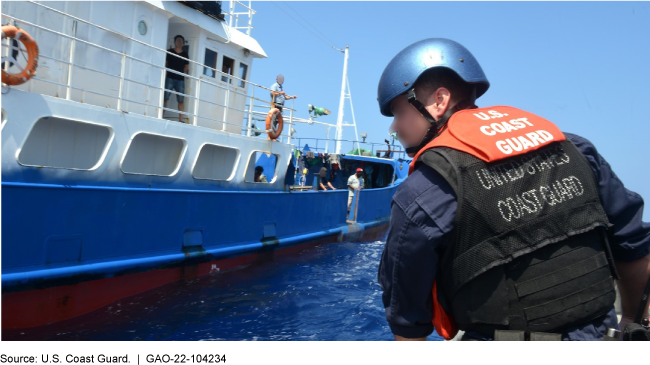Combating Illegal Fishing: Clear Authority Could Enhance U.S. Efforts to Partner with Other Nations at Sea
Fast Facts
Illegal, unreported, and unregulated fishing undermines the economic and environmental sustainability of the fishing industry in the U.S. and globally.
The U.S. works internationally to combat illegal fishing at sea. For example, the Department of Defense leads a program aimed at building African nations' maritime security and maritime law enforcement capabilities. However, DOD officials told us that due to a change in U.S. law, it is no longer clear that it has the authority to conduct all aspects of this program.
We recommended that DOD determine whether it has this authority and to seek it if does not.
Coast Guard Officials Preparing to Board a Fishing Boat

Highlights
What GAO Found
The U.S. works with other nations through multilateral agreements to collectively manage high seas fisheries. For example, the U.S. is a member of nine regional fisheries management organizations (RFMO), which are treaty-based organizations of nations with an interest in managing and conserving fisheries in specific regions of the sea. These organizations establish rules for vessels fishing in the RFMO agreement area, such as limits on the numbers and types of fish that can be caught. In addition, the U.S. establishes bilateral agreements and conducts at-sea operations focused on strengthening other nations' capacity to manage their own fisheries and fleets. For example, the Department of Defense (DOD) leads a program aimed at building African partner nations' capability to enhance maritime security and enforce their maritime laws. However, DOD officials told us that, as a result of changes to the 2017 National Defense Authorization Act, the department no longer has clear authority to conduct the operational phase of this program—known as Operation Junction Rain. By determining whether it has the authority to conduct this operation, and, if not, seeking such authority, DOD could continue efforts to support African partner nations' capability to enforce fisheries laws and regulations, which in turn helps them work to counter illegal, unreported, and unregulated (IUU) fishing.
Coast Guard Officials Preparing to Board and Inspect a Fishing Vessel

The U.S. collects and analyzes information from various sources to identify potential IUU fishing at sea outside of U.S. waters. For example, Coast Guard analyzes vessel location data to identify movements that may signal potential IUU fishing, and officials told us they use this data analysis to help to guide at-sea patrol operations to target these vessels.
Several interagency groups and processes help coordinate federal efforts to combat IUU fishing at sea. For example, an interagency working group, established by the Maritime Security and Fisheries Enforcement Act in 2019, coordinates U.S. efforts to address IUU fishing government-wide. We found that the working group generally followed selected leading collaboration practices, such as developing a written work plan. The working group's tasks include assessing areas for increased agency information-sharing on IUU fishing-related matters, identifying priority regions and nations, and developing a 5-year strategic plan to combat IUU fishing and enhance maritime security.
Why GAO Did This Study
IUU fishing undermines the economic and environmental sustainability of the fishing industry in the U.S. and globally. IUU fishing encompasses many illicit activities, including under-reporting the number of fish caught and using prohibited fishing gear. While the illicit nature of IUU fishing means its consequences can only be estimated, a recent study estimates catches from IUU fishing could cause global economic losses up to $50 billion annually. A variety of federal agencies coordinate with one another, as well as internationally, to address IUU fishing at sea.
GAO was asked to review federal efforts to combat IUU fishing outside of U.S. waters. This report examines how the U.S. (1) works with other nations to address IUU fishing at sea, (2) identifies potential incidents of IUU fishing at sea, and (3) coordinates its interagency efforts to combat IUU fishing at sea and the extent to which selected efforts are consistent with leading collaboration practices. GAO reviewed various international agreements and the mechanisms that support these efforts, as well as other relevant agency documents. We also spoke with officials from the U.S. Coast Guard, NOAA, and DOD, among others, about their approaches to identifying and combating IUU fishing at sea.
Recommendations
GAO is making one recommendation to the Department of Defense to determine whether it has the authority to continue Operation Junction Rain and, if not, seek the authority to do so. DOD partially concurred with our recommendation.
Recommendations for Executive Action
| Agency Affected | Recommendation | Status |
|---|---|---|
| Department of Defense | The Department of Defense should determine whether it has the authority to continue to conduct Operation Junction Rain and, if it determines it does not, seek the authority to do so. (Recommendation 1) |
In commenting on the draft report, the Department of Defense partially concurred with our recommendation to determine whether it has the authorities necessary to conduct Operation Junction Rain. Subsequently, in April 2022, the Department determined, in consultation with U.S. Africa Command and the Office of the Inspector General, that it has existing authority to continue Operation Junction Rain.
|
